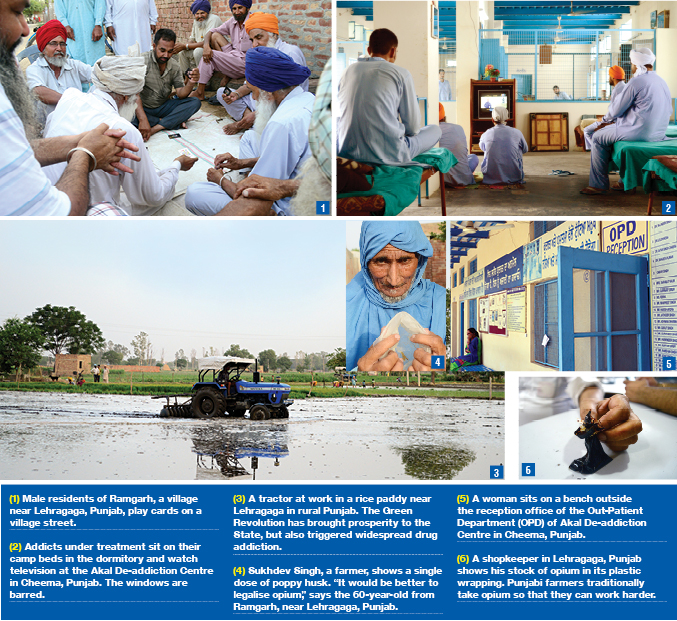

Gurinder Maan smoked his first dose of heroin in a homemade pipe made out of aluminum foil and a rolled-up 500-rupee note, shortly before he graduated from college at the age of 23.
“I was under a lot of pressure at the time and a friend said this would solve the tension,” he recalls. Maan was the pride of his family and his village in the northern Indian state of Punjab. He had good grades in school and expectations for him were high. His family had sent him to the State capital, Chandigarh, to study management and information technology. But after quarrels with his parents he became depressed and began to take opium. Then he moved on to ‘brown sugar’, as heroin is known on the street. A friend promised it would help with his depression. Maan is one of many young Punjabis who have become addicted to drugs in recent years. In the 1970s the State was the model region for India’s ‘Green Revolution’, a large-scale government programme to achieve
an industrialised, modern agriculture - turning the State into one of the richest in India. Many families became wealthy.
One result has been that today migrants from other parts of India work in the fields while the Punjabis themselves strive for better-paying jobs having higher prestige. In every small town there’s a college, posters everywhere advertise university-study opportunities in Australia or New Zealand, and an ’Indo-Canadian Bus Line’ goes straight to the airport in Delhi. ”Through the boom the Punjabis developed ever higher expectations and that is now the young people’s undoing. More and more are taking to drugs because they have no prospects here or are exposed to high pressure,” says Jatinder Preet, a journalist with the Sunday Guardian. The Ministry of Labour and Social Affairs in Punjab estimates that around 65 per cent of rural households have at least one drug dependent person. According to official crime statistics, in 2012 Punjab had around 10,000 drug offences, the highest level in all of India’s States. The figure represents more than a third of reported drug offences in the country.
The State government is trying to fight the problem by treating the addicts. There are already 10 State rehabilitation centres and another 13 are planned. There are also over 60 private institutions. One of these is the Akal De-addiction Centre in Cheema, a village in the southern part of the State. It was set up in 2004 by a faith-based educational foundation. It has 30 beds for resident patients and can treat 15 out-patients at the same time. The Centre is a sand-coloured, one-storeyed building. Two massive iron doors lead into a courtyard. The windows are barred and there’s barbed wire on top of the courtyard walls. Within two large rooms, the simple camp beds stand in rows.
”More than half of our clients are not here voluntarily. Their families or social workers brought them in,” says Sarindha Sethi, one of the Centre’s psychiatrists. The Centre provides medical treatment and psychological counselling. ”Most stay with us for a month. Forty per cent of our clients are truck drivers and farmers, but there are also 20 per cent who are students. Around half we can permanently lead away from drugs,” Sethi says.
Gurinder Maan has attended such a clinic. For five years he smoked heroin on the weekends, yet managed to complete his education and find work in customer service at an electronics company. A large part of his salary went into drugs.
“Eventually I only lived for the weekend. By Fridays my hands would be trembling. It destroys you,” he says. It was with the encouragement of his wife that he decided to finally get off drugs. To mitigate the severe physical symptoms of heroin withdrawal, he had to take opium twice a day. After a month in a clinic he was able to return to work.
Opium has long been part of household medicine chests. Among farmers it’s a tradition to consume opium in the form of ‘poppy husk’ - a brown-green powder obtained by grinding the pod of the poppy. “We take it as a stimulant. It is much less dangerous than alcohol,” insists Sukhdev Singh, a 60-year-old farmer from Ramgarh, who has been taking opium for 10 years. His worry is not that young people will take to opium, but rather that the illegal supply will be interrupted. That might lead to a drop-off in labour performance by his workers. They nod in agreement as he speaks. ”It would be better to legalise opium,” he says.
His foreboding of a drug-free future is not unfounded. Around 50 people have been arrested in raids in recent months, including members of the ruling party in Punjab. As public outrage at
politicians corrupted by drugs rises, local police have cracked down on opium consumption.
”It doesn’t help to put young people in rehab while the dealer gets away unscathed,” says Bhagwant Mann, a Member of Parliament for the Aam Aadmi Party in the south of the State. The first goal has to be to restrict trade, and that’s only possible if the involvement of local politicians, the police and organised crime drug dealers is broken. Aam Aadmi, which calls itself the Party of the common man, did well in the May parliamentary elections, by articulating the concerns of many people in Punjab about the rising drug use. ”We are losing a generation and perhaps won’t see one to succeed it,” Bhagwant Mann says.
It took two years before Gurinder Maan could get of opium. ”After the withdrawal my family never let me out of their sight,” he recalls. Today he teaches English at a public school. He says that he can also help the kids live better lives. ”Because of my experience I can credibly show the young generation in Punjab the bad consequences of drugs,” he says.
Read More...